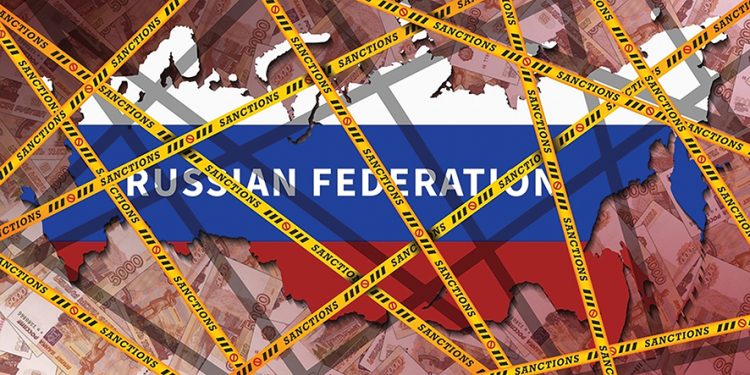Some time ago we tried to discuss the essence of economic sanctions, to which we devoted a large article. At that time, this reasoning was especially relevant for Georgia in the context of a very important military conflict in terms of geographical proximity and impact – the war initiated (and still ongoing) by Russia in Ukraine. Back then, when talking about this very fundamental issue, we were mostly limited to certain theoretical aspects of it. Today, looking back over the more than one-year history of the war between Russia and Ukraine, we will try to expand even further on some of the issues discussed then. We will also look at some of the practical problems of Western sanctions against Russia. Obviously, both then and now, we are reasonably understanding that somewhere we will not be able to fully say what we have to say, and somewhere what is said will turn out to be controversial. This is natural, since such “blunders” characterize the discussion of problems recognized by sanctioning science; moreover, without them, the discussion would be incomplete.
Before discussing new facts and circumstances related to the topic, however, we think it necessary to summarize and partially correct, so to speak, the opinions previously expressed. We think this will be useful for the current discussion of the question, and will serve as a necessary “introduction.” Therefore:
• The mechanical abundance of sanctions (their implementation in “waves”) does not always mean the effectiveness and efficiency of sanctions measures;
• Expectations of concrete practical benefits from sanctions are often exaggerated, and the instant “sanctions miracle” is mythologized;
• The specific purpose or content of sanctions is determined by the essence of the conflict or challenge itself; The essence of conflicts and challenges changes and evolves in the wake of changes and challenges in international relations themselves. Thus, a sanction that is effective in the context of one particular situation may be completely useless in another situation;
• The implementation of sanctions must be based on an understanding of their specific objectives and purpose, rather than on an agenda-driven or political and ideological impact; otherwise, a sanction measure that is far from practical rationality will soon fade and lose credibility, both for its target audience and in the eyes of its implementer;
• The imposition of sanctions is not a one-time act: a sanction or package of sanctions should be managed and monitored in the process, both in terms of necessary adjustments (escalation/de-escalation) and in terms of logistics; otherwise, the political and moral power associated with economic coercion may be squandered on one noisy but fruitless “shot”;
• The practical application of the sanction is determined as much by the historical context at the time as by the degree of codification of international relations and the current level of technological development;
• The likelihood of success of sanctions is greatly reduced in relation to a closed or authoritarian target country; And a high degree of authoritarianism is directly related to a lack of informational sanity, control over public perception and attitudes on the part of the authoritarian;
• It is advisable to pay more attention to imposing “smart” sanctions rather than comprehensive ones, in order to avoid as much as possible the “pain” of sanctioning an untargeted audience, while making sure that the full burden of sanctions is directed at the target audience;
• A plan related to sanctions should consider immediately after their imposition the order of a thoughtful exit from sanctions: the right balance of “carrot and stick” is one of the main prerequisites for effective economic coercion and deterrence;
• Given today’s global interconnectedness, it is very difficult to affect others with sanctions policies in ways that do not impact you in some dose and scale. This is especially characteristic of the conjuncture of large economies, and as their degree of integration increases, the problem becomes all the more acute;
• Sanction is a form of economic coercion, although its connection with the economy is not limited to such coercion. Given the specifics of trade and business relations with a target country, economic coercion may be associated with the necessary preparation or realignment in one’s own economy, especially with a view to the timely and less costly replacement of the exported commodity nomenclature. For its part, all this may be associated with the risk of squandering political credibility capital in the eyes of one’s constituents;
• It is erroneous to think of sanctions as a universal recipe for resolving the fate of war and peace, and only their application to complex crises can be even more controversial.
Obviously, the war between Russia and Ukraine, as well as the First World Economic War itself which is waged against it, will provide new theoretical and practical material for the direction of geoeconomics, which is associated with the practical application of economic coercion or deterrence.
Expectation
The first wave of Western sanctions against Russia was launched back in 2014 as a result of the annexation of Crimea. To say that they had any effective influence on Russian policy would be wishful thinking. In fact, looking at the processes that have developed since 2014, one need not go far to draw such a conclusion. Moreover, Moscow has intensively launched an import substitution program, especially in the sphere of agricultural products and imports from the Eurasian Economic Union. The so-called parallel imports, which generally characterize the sanctioned economy, have become a topical issue.
The war that began in February 2022 added a new charge to the sanctions pressure of the West. However, in this case, too, this pressure was gradually gaining strength, which probably explains the ability of the Russian economy to adapt to the sanctions conditions that were revealed at the initial stage. It should also be noted that, in addition to the measures taken by Moscow to reduce the sanctions pressure, among which the monetary policy of the Central Bank of the Russian Federation stands out, the lack of much enthusiasm on the part of foreign businesses to leave the Russian market helped to minimize the effects of the sanctions. After the first reaction, some turned to Russia again, some continued business through third parties or under a changed name, and some, instead of officially withdrawing from the Russian market, announced that they were suspending their activities. Understandably, it is not very pleasant to talk about this, especially when it comes to effectively restricting the aggressor country. However, to be objective, one must remember that one strong counterbalance to the stated idealism is the realist impulse to benefit through the interconnectedness of major economic systems. It is very likely that this impulse will determine the course of international policy and the dynamics of economic coercion measures in the future as well.
Speaking of Russia’s response, we mentioned parallel imports and countermeasures of the Central Bank of Russian Federation. However, we should also mention other steps taken by Russia to bring itself to the present day, including maximum focus on the domestic market, capital reserve in the pre-aggression period, and greater activation of trade relations with neighboring countries.
The circumstances listed in this part of the article certainly do not suggest that this most important direction of geoeconomics – sanctions enforcement – is anything but a futile and fruitless exercise.
Obviously not. Among the most difficult tasks facing the Kremlin today are finding additional funds to continue the war, the reputational stigma of sanctions, and the burden on the population (and business circles?). Over time, these tasks may even become insurmountable. Moreover, the further militarization of the economy in the Russian Federation creates the possibility of a repetition of the precedent of the Soviet Union. This threatens the unity and stability of the entire Russian state.
The practical point is something else: in order to achieve a real result, especially for such a complex, large and adaptable economic system, the expectation of an “instant” result of sanctions must be realistic.
Achieving the goals of the sanctions requires time, consistency, and the broadest possible coalition of participating countries. That is why we have devoted the introductory part of the article to serve as a kind of supportive guide to the individual aspects discussed in the following chapters.
The past period in its generalized form…
… has shown us that large-scale sanctions are characterized by two sides of the coin. In other words, unqualified supporters of the sanctions instruments have been given enough material for reflection, and for those who doubted the effectiveness of these instruments, the ground has been created for reassessing their attitude. More specifically, so far, the situation in the West and Russia is as follows:
Despite the initial blow, Russia’s financial system remained relatively stable, and the Ruble regained its footing some time after Western sanctions were imposed. This interim success is also largely attributed to the technocratic approach of the Central Bank. We should also objectively mention the oddities seen in the Western approach. Among them are the belated decisions to take measures aimed at “breaking” the backbone of the Russian economic system – its energy sector – as well as the creeping, rather than immediate and complete blocking of the circulation of Western debit cards inside the country and Russian financial institutions. An echo of a certain dissent, timidity, or “rationality” in the ranks of the Western coalition is that the Kremlin’s income from Russian oil exports in 2022 was $220 billion, 20% more than in 2021. As a result of the mentioned and a number of other circumstances, instead of the predicted 8.5% decline of the Russian economy in 2022, the actual decline was 2.2%. However, this is only the “bright” side of the aforementioned coin.
Clearly, parallel processes were developing in the sanctioned economy, which were almost impossible for Moscow to avoid, given the scale of enforcement measures and, accordingly, the potential of the participants in the anti-Russian coalition. For example, last January alone, the budget deficit reached $25 billion, which directly affects the current account deficit. The situation is also difficult on the technological side: Moscow has been forced to replace high-end products, especially in the semiconductor sphere, with low-quality Iranian and Chinese products. Not to mention the everyday life side, such a radical change has a direct impact on the course of modern warfare.
It is also worth noting that the imposition of much more effective sanctions on the energy sector makes it virtually impossible for Russia to compensate for its sharply reduced revenues in any other way. It is true that the purchase of Russian oil by India and China has recently almost tripled, but even here it should be remembered that these purchases are made at a sharply discounted price. At the same time, first the embargo on crude oil and oil products from Russia by Russia’s main export market – the European Union, and then the “price cap” established at the initiative of the G7 made it virtually impossible to sustainably develop the sector with new investments. Added to this was the ousting of Russian firms from the global capital market, which cut off one of the effective sources of making up for energy export losses at the expense of cash loans. If we turn to the numbers again for greater clarity, the International Energy Agency predicts that Russia’s treasury losses from oil and natural gas alone will approach one trillion dollars by 2030.
The discussion of the statistical and arithmetic results of the Western world’s sanctions against Russia is usually as extensive as the analysis of the geopolitical and domestic aspects of this mega-geo-economic confrontation. Neither this article nor the format of several broadcasts will suffice for a detailed discussion of this second aspect. Nevertheless, we will attempt to raise some critical and debatable points in order to better understand the big picture.
As has been said, the euphoria of expectation of a quick result appeared when sanctions were imposed against Russia. Over time, this euphoric mood subsided, and some practical nuances or necessary reminders related to measures of economic coercion emerged:
• The program of specific sanctions measures is a kind of marathon to achieve a tangible result;
• A much more realistic and practical result of sanctions is the exhaustion of the economic potential of the aggressor’s war machine, rather than a change in its external course;
• We mentioned realistic expectations, and probably one of the main expectations for authoritarian countries is that as a result of pressure, living standards will fall so low that it will cause civil discontent within the country. Two basic questions should be raised at such times: (a) How effectively will such discontent contribute to the necessary changes in the internal life of the country? (b) To what extent do internal changes lead to a change in the goals declared in the country’s foreign policy and to a realignment of the country’s foreign policy toward civilized principles?
In Russia’s case, both issues are relevant. It should not be the case that, despite appropriate efforts, instead of a nuclear-armed Russian Federation deviating from international norms and standards, we get an “Upper Volta equipped with missiles,” to use the expression of the famous journalist Smiley.
At the same time, we look at the optimistic expectations of some sources of the so-called “post-Putin” stage with some skepticism. To summarize in a few theses, such skepticism is related to: (a) the historically expansionist nature of the Russian state, especially with regard to the neighborhood; (b) the brevity of the “democratic” era in contemporary Russia and the inability to grow into a lasting state and political tradition; c) the style of governance, formed as the so-called “system”, for the internal stability of Russia, which is based on a certain structure of relations due to the Russian ethnic character and historical past;
At such times, the political course is mainly influenced by the “system” and not by who is at the head of it;
• With regard to Russian aggression, the deterrence purpose of the sanctions has hardly worked. It is highly likely that one explanation for this is the nature of the “seeming” sanctions imposed after the annexation of Crimea in 2014, their spinelessness and characterlessness. Thus, the main burden is now shifted to the second purpose of the sanctions – the depletion of the aggressor’s military and economic resources, which is a long and labor-intensive process;
• The effectiveness of sanctions is determined not only by the maximum pressure on the target country. The necessary “effectiveness” is also determined by the adaptation of the economic systems of the countries implementing sanctions that will find themselves in the new reality. It should be noted that despite certain challenges, the Western system as a whole, from maintaining political unity to switching from Russian energy resources to alternative sources, is still coping with the new reality. Under these conditions, Moscow – for the time being – is unable to create a split or disagreement of such magnitude in the ranks of the Western coalition, which would create a sufficient prerequisite for Russia to achieve a geostrategic advantage;
• The full realization of the objectives intended by the imposition of sanctions is a great challenge because: (a) the effect of sanctions is not static; (b) the target, usually an authoritarian country, has the ability to adapt to sanctions in its own way; (c) modern economic relationships allow for finding practical ways to combat sanctions, both by exploring new markets for action and by finding new revenue streams.
It is a fact that whatever the balance of strengths and weaknesses of Western sanctions against Russia, whatever the difficulty and complexity of effectively pressuring a large economy integrated into the global structure, whatever major “faults” characterize the theory and practice of sanctions in general, nevertheless we have ample reason to assert that…
To be continued.
Analysis by Victor Kipiani, Geocase Chairman














